 The trail of suicides at the Foxconn factory
The trail of suicides at the Foxconn factory 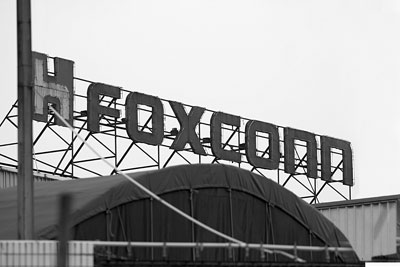
The chain of suicides, which occurred in 2010 among young workers in the world's largest "unnamed" town-factory, has shaken our false consciousness of Western consumers, in line to buy the new iPad or the last Nokia smartphone. There are 420,000 workers, between 17 and 24 years, working in the department of Foxconn, divided between Longhua and Shenzhen in the Chinese region of Guangdong. In the 20 factories that the Foxconn in China employing over 800,000 people.
Foxconn Technology Group, based in Taiwan, is the world's leading manufacturer of electronic components for notebook computers, cell phones and smartphones, cameras, mp3 players and video games. Among users of the leading brands of consumer electronics in the world: Apple, Dell, Ericsson, HP, Microsoft, Motorola, Nintendo, Nokia, Samsung and Sony. Many of these companies have ethical codes of conduct, which should (at least on paper) to make them socially responsible for what happens in the supply chain.
Lee Cheuk Yan, 52, head of the Hong Kong Federation of Trade Unions, told the agency AsiaNews that " the 15 attempted suicides and 13 deaths at Foxconn (January-July 2010) are the results of a policy of oppressive and blind management. For workers, especially migrants, the situation is terrible: they are treated like animals, despite having left their homes and families to seek employment. They have no family support, they face incredible pressures and have no human support: Choose the most extreme because they have no alternative. Here in Hong Kong do not have jurisdiction over mainland China, but we can push for their factories to treat their workers humanely. There is no other way to prevent suicides. " (1)
The responsibility for this situation, he continues, "is surely the Chinese government. But the international community also has its faults, because it seeks only cheap labor without worrying about how this works. That's why we must ensure that there is more awareness of the situation: we must fight together to ensure the fundamental rights in the labor force. But this, as I said, for now raises very little interest in the rest of the world: the crisis pushes everyone to look for cheap products."
The blame is not only the Chinese system, with the communist authorities and transnational American, European and Japanese, who base their wealth on the intensive exploitation of migrant workers treated like animals for meager wages (the wage at Foxconn is about 90 euro per month), but the very logic that regulates the economy and the competitiveness between producers in a global market.
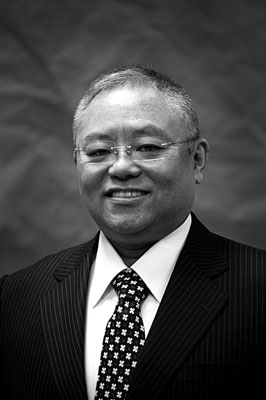 |
Sindney Lu, Chief Executive and
Vice President of Foxconn
Connector & Cable Division |
The Foxconn, after being "beaten" on the front pages of newspapers, was immediately justified by saying that working conditions in its factories are the same as in many businesses in China. Then, in order to stem the suicides of workers, has mounted a half million square feet of protective nets to prevent the death of one who throws himself into space from the roofs of warehouses and dormitories. Finally, after paying the usual crocodile tears, announced a 30% wage increase for workers on the assembly line (200,000 of the 420,000 factory workers), taken two thousand "psychologists" and some Buddhist monks introduced in the wards.
Even the bureaucrats in Beijing run to safe havens. They sent a team led by Shenzhen Yin Weimin, Minister of Human Resources and Social Security, to ascertain the causes of suicide. At the same time the Office for Labour and the official Chinese trade union, the All-China Federation of Trade Unions (ACFTU), have decided to set up local offices to address the "malaise" of young workers. Curiously, no one has raised the issue of revising the conditions and working hours.
Yet, to ensure the supply contracts with major global brands of consumer electronics, hundreds of thousands of workers in large factories of Foxconn, they work shifts of 10-12 hours for 7 consecutive days out of 7 with 30 minutes to eat and 10 minutes to go the bathroom. Do not leave. Anyone without a special permit to enter or leave the factory, watched over by guards 40,000 militia company (one every 20 workers). The factory is actually more like a prison barracks. In the production departments, but also in the dorms and cafeteria, has imposed a strict military-like discipline. Orders of superiors are not discussed. Workers are fined for the slightest infraction. They can not even talk to each other, but are encouraged to spy on colleagues and if they do they get benefits.
This is the model of work organization that has made China the "world factory" for the price of inhumane working conditions. And, all in the absence of unions that protect workers' rights.
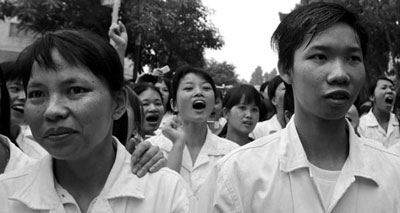 |
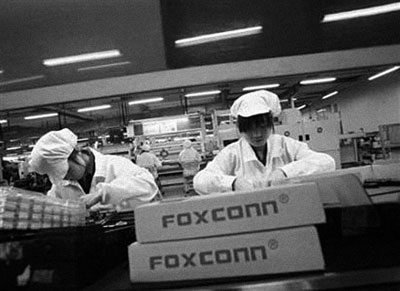 |
 “Without freedom communism is a barracks”
“Without freedom communism is a barracks”
Thinking about the Foxconn and the system of "martial" work imposed in China, can not come to mind the prophecy of Bakunin in 1872 during the conflicts with Marx on the future of the First International Workers used the concept of imagery "from communism barracks "to indicate where the political ideas of German philosopher would lead. Bakunin had realized that "the most fatal combination" would "combine socialism and autocracy." He would never have imagined that this aberrant synthesis, it would be followed by another. The combination of a communist despotism (the synthesis between socialism and autocracy) and the purest form of hyper-liberal economic historically applied (along with the release of Pinochet in Chile) for the exclusive benefit of private capitalism and techno-bureaucracy of the state.
Marx himself in analyzing the current levels of exploitation of workers in China, comparable to those observed by him in the first industrial revolution in England, should recognize that the criticism of Bakunin's idea of "dictatorship of the proletariat" were relevant. Of course, the owner of Foxconn, Terry Gou is not a Marxist. But it is equally true that the Chinese Communist Party has a very broad claim by capitalists in the world. It is not just a matter of cheap labor, which is widely present in other countries.
As written by Chinese dissident Wei Jingsheng social development of the "dictatorship of the people" exercised through the Communist Party of China, "has helped the capitalists to destroy the most important opponent in the competition for the job, or trade unions. Without unions representing workers, industrialists have no need to pay reasonable wages to their workers. The "added value" theorized by Marx, was produced in China, and in a manner entirely clear." (2)
No system, however, is perfect. And as often happens, "the devil is in the details." The anguish working to Foxconn, the unbroken trail of suicides and suicide attempts, points out the deep malaise that exists between the new generation of migrant workers. Increasing numbers of girls and boys who rebel against the inhuman work pace and a life enslaved to the assembly only. And, as shown by the strikes at the Honda last May, China's economic growth is the same with the numerical expansion of the industrial workers, which helps make workers aware of their importance in the production process. They are signs of a transformation that is affecting the industry and the Chinese labor market.
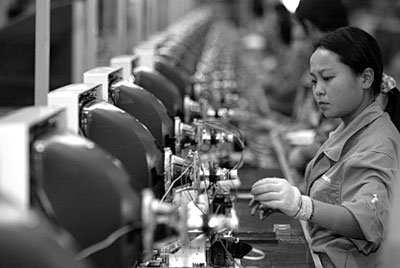
 The new generation has ravaged the world of work
The new generation has ravaged the world of work
The policy of "one child" is already reducing the surplus of cheap labor. Over the past 20 years the number of Chinese aged between 15 and 24 stood at around 200 to 225 million. Forecasts to 2024 tell us that this number is expected to fall by one third, giving more bargaining power to young people who are entering the job market.
In Guangdong in 2010 was recorded for the first time, a shortage of manpower. Arthur Kroeber, editor of China Economic Quarterly, wrote: "For many years companies have made as if China had an unlimited supply of young people ready to work for modest wages. It will no longer be so for the next fifteen years and they will pay more for new hires, and make more efforts to keep them, because they will not be easy to replace them." (3)
For many years the workers have accepted indecent working conditions in China, because between them was common to think that if they strike, they would be thrown out. And the company had no difficulty in replacing them with thousands of people waiting to take any kind of jobs. Now, in companies that have a crucial need for labor, these young workers have a stronger leverage. The one-child rule has changed the flow of workers at low cost, guaranteed for 30 years, both the composition of the workforce. To dominate is the young migrants, only children, who come from the countryside.
If the first generation of migrant workers in China was made up of farmers with a low educational level, without a knowledge of the industry, willing to accept inhuman conditions of work and life, just to make some savings to clear debts or to support the investment in the family place of origin, the second generation is less willing to tolerate low wages, long hours and the iron discipline imposed in the barracks buildings. They want decent working conditions. Young migrant workers have no life outside the factory, do not have a to which they can return as peasants. Their perspective is bound to improve, then the change in working conditions and relations in the factory and the recognition of full citizenship rights.
The condition of internal migrants in China is, in fact, made worse by the fact that these are not given the status of urban citizenship while working and living in urban cities. This excludes them from certain fundamental rights such as health care, social security, housing rights, etc.. Finally, unlike the previous generation they are mostly graduates, are more aware of their rights, surfing the "internet" and bear less and less to be treated like robots, and watched as recruits in barracks.
But as he wrote GianPaolo Visetti on Repubblica, "increases costs and recognizes their right not to be slaves, like their fathers, drives productivity, but does away business. This is why the government is divided. Innovators link on rising wages, to support domestic consumption and strengthen the metropolitan middle class. Conservatives call for the suppression of any protest to save authoritarianism based on exports and miserable in scattered villages. The rest of the planet simply update the agenda to modernize quickly in technology and infrastructure in India, Vietnam and Cambodia, to turn them into China's promises of the next East." (4)
In fact, there are few transnational corporations (TNCs) and Chinese export oriented, with the crisis of the global market, have begun to de-localize the production and procurement of components in the poorest regions of China and other Asian countries where wages are even lower. In this light we can understand the concern and the political dilemma of the Chinese government: how to allow the increase of wages and family incomes to support domestic consumption, without discouraging foreign direct investment, supported by three decades of cheap labor and by a trade union that, when there, watches the workers rather than defend them!
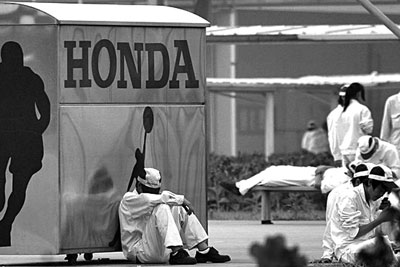
 The new wave of strikes in Guangdong
The new wave of strikes in Guangdong
On May 17, 2010 the workers of Honda Motor factory in Foshan in southern Guangdong province, after years working 12 hours a day, six days a week, decided to fold their arms. It is the beginning of a new season that can reverse the balance of power - for better and worse for the workers to the bosses - the "laboratory of global change" that is China. The ill-concealed interest was defined as no other than Roberto Colaninno, chief executive of Piaggio, to a newspaper in an interview. His company in Foshan, not far from Honda, manufactures scooters with over 800 employees, broken down into two shifts working 12 hours a day including Saturdays and a single shift of 10 hours plus 4 or 8 hours of overtime per day, for a salary of between 82 and 120 euro per month (excluding overtime).
Since that day, for fifteen days, the Honda Motor workers went on strike, demanding better wages and working conditions less exhausting. The three other factories of the second Japanese automaker in China, Zenhcheng, Huangpu, Wuhan, were forced to suspend production. The Group Honda had just decided to increase by 2012 to produce vehicles in China from 650 to 830,000. For the auto sector this is already the first market in the world with 13 million 600 thousand vehicles sold in 2009 (+50% compared to 2008) and a forecast for 2010 by more than 15 million.
Honda's interest in this market and the strength of the strikers led, eventually, the Japanese management to accept negotiations with the representatives indicated by the employees and by the mediation of the Chinese government, which in this case, decided not to intervene with force. The workers have received wage increases of 24 percent (the request was 50 percent), bringing the monthly basic wage of 180 euro, not far from 214 Euros per month held by the NGO Chinese Sacom a decent minimum wage for the region of Guangdong , the most industrialized in China. The minimum monthly wage established by law in 2009 was approximately 90 euro per month.
Of the 1,900 workers of the Honda Foshan more than 600 are students in vocational schools, who are requested a period of work between 6 and 18 months to get the diploma. Their pay is about 2 / 3 that of a regular worker. As soon as the fight broke out at Honda, students on placements had to sign a written undertaking "not to organize or participate" in any initiative to combat. Although there has been intimidation of these interns adherence to the strike has affected 85% of the total workforce.
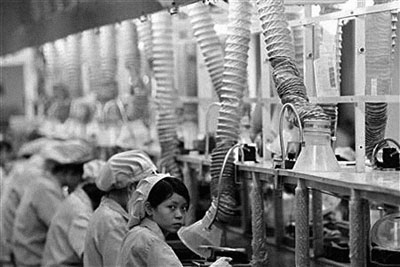
The young workers of the Honda Foshan have made extensive use of social networking tools to organize and coordinate the strike. They have created a discussion forum on the internet, spreading an online bulletin on their struggle. They used their cell phones and computers to send messages, photos, videos and chat on message service "QQ", very popular in China. Geoffrey Crothall, editor of China Labour Bulletin (5), which documents the working conditions in China, explained that clears the chat and get around censorship. And in those days the workers of the Honda, chatting with each other, exchanged views on the useless role of union officials and the need to rely on themselves.
The union shop "ACFTU", controlled by the Communist Party of China, is entirely subordinate to the interests of the state and enterprises. On the economic level is maintained, not with the voluntary participation of workers, but with 2% of the total salary that companies must pay for law and government subsidies. In many cases, its representatives are appointed by the management of the companies. "The union does not represent us," said a young worker remained anonymous in Honda. "They have asked the management to negotiate with us, but did not help us." Indeed. In a reversal of the classic confrontation in pickets in front of the concierge of the factories, while the workers resisted outside the gates to support their claims, the men with "yellow berets" of the union ACFTU, with company officials, arrived to attack them and shoving them back to the factory, seeking to end the strike.
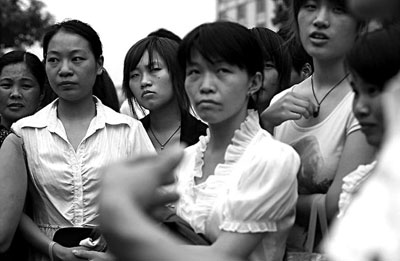
The government during the strike at Honda Motor Foshan has chosen not to involve the police, to prevent others clamor after the case of Foxconn, finished on the front pages of newspapers around the world. The aim was not to light a fuse that could blow up the contradictions of a country whose economy is growing at a ultra pace incurred without the workers' wages and incomes of the majority of its population to do the same. In reality protests and work stoppages in factories in China are nothing new. In Guangdong, for almost a decade the conflicts of work have multiplied, and the rest of the country during the privatization and restructuring of the State, there were bitter social conflict for heavy layoffs and the closure of many companies.
The novelty in this case was not having punitive action against the strikers. Unusual was also the initial coverage given to the protest by state-controlled media and the legitimacy of workers' demands. Only a few days after the government intervened directly to Chinese media imposing silence about the struggles to avoid being emulated by other factories and in other regions. The possible knock-on effect of workers' strikes have seen, of course, is concerned by Beijing. The fear is that the protest would expand like wildfire, undermining the delicate balance that led to the boom economy of the Asian giant (very low cost of labor and "caged" workforce).
In fact, the impact of the strike at Honda Motor in the entire chain of subcontracting car industry (the heart of China high-tech exports) had a strong impact in other sectors of manufacturing industry in Guangdong and other regions of China. In Guangdong, according to the government newspaper China Daily, between May 25 and July 12 there were at least 36 strikes. And always the Chinese press reported that in May there were twelve strikes in large enterprises including, in addition to the Honda Foshan, Sharp Electronics in Shanghai and Wuxi in Jiangsu Nikon. Even Chinese companies have been affected by strikes, as the Pingdingshan Textile Group, in Henan, where more than 5,000 workers were detained for two weeks, blocking the entrance to the factory until it has opened negotiations on rising wages.
Direct action in the Honda factory in Foshan was, in fact, just the tip of the iceberg. Just ended their dispute went on strike 250 on 600 workers of Foshan Fengfu Autoparts, controlled 65 percent by Honda Yutaka Giken and 35 percent by Taiwan Moonstone Holding. The non-payment of days lost due to the business decision to cease production and low wages were the spring to the protests.
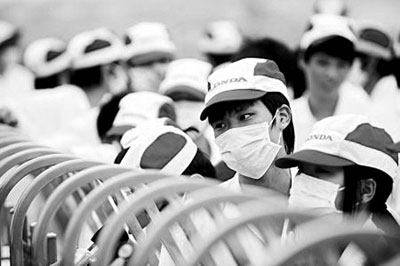
On May 28 more than a thousand employees of the Beijing Xingyuche Technology, which supplies frames and spare parts to the plant of Beijing Hyundai Motor of Korea, are on strike demanding and getting higher wages. The Hyundai Motor Company has been in the same direction, in order to retract the direct action of workers, promised higher wages. Meanwhile, other 2,000 workers in the Kok Taiwanese company that produces equipment in Kunshan City, Jiangsu Province, went on strike against overtime, the work environment and low wages. In this case, the police intervened and, in clashes with striking workers, injuring 50 people, including five seriously. The workers continued the strike until the management had agreed to negotiate with them.
In June it was the turn of another company owned by Honda and owned by the city of Xiaolan, Zhongshan Lock the Guli. 1,700 workers went on strike a week asking for an increase of 50% of salary, to bring their wages to the highest of Honda of Foshan, and the recognition of an independent union. They finally had to accept only an average increase of 32 euro per month (including basic pay and allowances and night shift), which, although far from expectations, still represents a 24% wage growth equivalent to that obtained by the workers of Foshan. During the strike have posted online detailed accounts of their struggle, disseminating information not only among themselves but also to workers on strike and unrest in other parts of China. They used their phones to send text messages to their colleagues to resist the pressures of the individual heads of the factory. They spent much of their time using the Web to find material on labor legislation in China and know the rights granted and those denied. They even registered a website controlled by the State - workercn.cn - turning it into a node of the digital movement of Chinese workers. And armed with their computers have spread the video on the violence of domestic security business against workers on strike.
"We filmed the strike with our cell phones and we decided to post the video online to let others know how we were treated unfairly," said a worker of 20 years of Honda Lock, who requested anonymity because of the threat of retaliation. (6) In fact, one of two leaders of the fight to Honda Foshan, Xiao Lang was fired by the direction immediately after leading the strike. Xiao had created a chat the night before the strike, on which was discussed and decided between forty workers how and when to meet, when go on strike and how much to ask for the salary increase.
In the same month of June were concluded two strikes in other factories in Guangdong that are also suppliers of Japan's Honda. Workers at the Atsumitec Auto Parts, which produces levers for changing the car, they got an increase of 45% of the average monthly wage, which rose from 112 euro to 163 euro. Omron Automotive Electronics those of Guangzhou, had a smaller increase of 35 euro per month, which brought their wages to 145 euro. Other strikes in the area of auto parts for Honda and Toyota have been concluded with increases between 20 and 30% of wages, which are all now well in excess of 120 euro per month, a level still low, but that until a few months ago was achieved only by a few skilled workers.
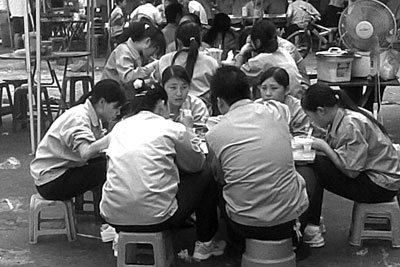
In Cars related manufacturing sites, finally, two other disputes. Nihon Plast of Zhongshan, which produces plastic components for the Honda, where 500 workers went on strike, protesting working conditions and demanding wage increases. Denso of Guangzhou Nansha, which produces automotive components for Toyota and Honda, 1,100 workers went on strike from June 21 until 25, when they have reached agreement on year-end bonuses and increasing wage of 50-60 euro per month compared with previous monthly salaries for workers of 130-150 euro and 350 euro for technicians. The strike had caused to Denso, from June 22, also blocking the production of Toyota Motor.
The common denominator of these struggles (7) is that since workers can not count on the union officials, they organized themselves spontaneously. Not all suspensions (such as the Chinese press euphemistically calls the strikes), that occur in Chinese factories, are reflected in the media. Also, many disputes are short and are not even reported. One thing, however, is evident. The battle at Honda, followed by other factories, reflects a larger trend in China. The growing tension between workers and firms are changing the balance of power in favor of workers. Companies that, for many years relied on a source of cheap labor and a rapidly growing market, are now more difficult to attract and retain workers, who are demanding better wages and working conditions.
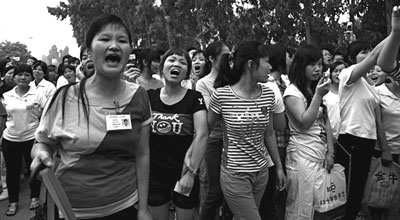
 China will never be the same
China will never be the same
China is now the largest exporter in the world, having overtaken Germany in 2009, and the second world economy after the United States. In just 20 years has increased its presence in global industrial production from 2 to 20%. While in Europe and in North America industry workers have declined, China's workforce in manufacturing industries has reached the 112 million people, thanks to migration from rural areas of the interior. 70% of those working in engineering firms. According to estimates by America's Bureau of Labor Statistics the average hourly cost of a laborer in 2009 in China was $ 0.81, equivalent to 2.7% of the cost of the work of an American worker. The cheap labor, however, will be reduced. The young Chinese workers, at least in cities like Shanghai and Beijing or in the Pearl River Delta (Guangzhou, Dongguan, Foshan and Shenzhen, bordering Hong Kong), have become as expensive as many of their Filipino or Thai peers, and much more expensive than Vietnamese and Indians. After the wage increases granted in the Honda Group and other companies in the supply chain, a Japanese analyst, Mitsuo Shimizu ruled that "[...] the manufacturing costs for manufacturers operating in China will increase, as did in Japan and in other developed countries." (8)
This perspective, and uplifts the spirit of trade unions in developed countries, is of concern to transnational enterprises. According to UNCTAD, the stock of capital invested in China by foreign companies is nearly $ 500 billion. Companies controlled by TNCs in China employing more than 16 million people. For a decade this "happy" combination of communism and capitalism has dominated the growth of global production and shipment of goods less expensive from the ports of China. Of the 200 largest exporters from China well 153 are U.S. firms, Korean, Japanese and European, against which - ironically - would have had to reduce customs duties evoked by many to stop the "yellow" Invasion.
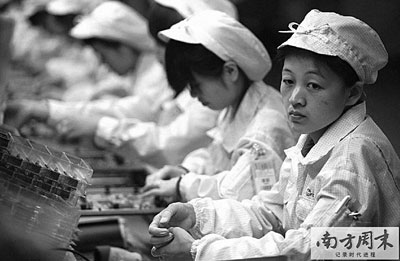
The same hypocrisy with which concerned Alberto Vettoretti, president of the European Chamber of Commerce in the Pearl River Delta and general manager, Dezan Shira & Associates, and other Italian entrepreneurs, react from the pages of the Sole 24 ore to the end of the labor low cost.
"The Delta is great, but the tam tam runs fast between workers from factory to factory and now everyone knows that here in the area, facing the pressures of workers, what Foxconn and Honda have done to drop their pants granting wage increases out of every logical contract . With this background, it is reasonable to expect soon other wild claims in other factories in the area. " The answer, indirectly, in the same article, the independent economist, Andy Xie: "For a long time the Chinese manufacturing industry has been able to count on a virtually unlimited pool of cheap labor, but today the picture has changed radically. The peasants who, until a few years ago, migrated happy to go to work in the factories of Guangdong, are no longer willing to move thousands of miles from home for a salary that guarantees their right to subsistence. Today, those who leave the village to transform themselves from a peasant worker wants more. "And the question of what will become of the world's largest industrial platform, if wages continue to grow, Andy Xie has no doubts "We repeat what has already happened in the past in Taiwan or in Korea: the low value-added production will move to countries with lower labor costs."
Only those who can hide in bad faith, business and political field, a fact: the Chinese economic model, based on low labor cost and the absence of genuine trade unions by the Communist state was oriented to the needs of the capital to attract foreign direct investment even at the expense of the population. It is equally true that this pragmatism of the government has transformed China into an economic powerhouse. There is no denying that the country is richer, but the people who are contributing to the total income (hundreds of millions of workers and migrants) are excluded from wealth. Income from work on China's GDP has decreased from 57% in 1983 to 37% in 2005.
According to Lu Huilin, a sociologist at the University of Beijing, the authorities should change the model of development because it sacrifices the dignity of millions of workers. "[The country] has used so huge ... the cheap labor while ignoring the human rights of workers and a fair society ... The young migrant workers resist exploitation by instinct ... But if you do not change, the problems emerge as rivers" . (10)
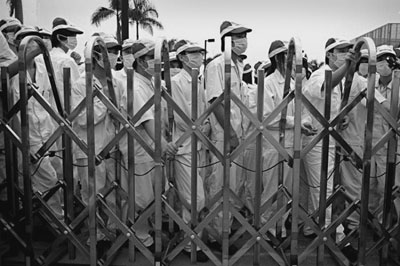
The question of wages and the weekly duration of working in central China in the near future. At the same time Government is arguing that the issue of salaries is somehow addressed. It is no coincidence that in May this year the legal minimum wage (which has an indicative value for trading in the company) has been increased by 20% and in July, following a wave of strikes, has been approved by the Council Legislative reform law of 2011 which would introduce a minimum wage. Although the approved standard is still incomplete on key issues such as establishing the value of the minimum wage per hour of work and whether it should be combined with the Index of Consumer Prices, is a clear willingness by Beijing to boost domestic demand (as it occurred in Brazil). To do this it needs people who earn more and can eventually buy the goods they produce. Conversely, the policy of low salaries shortness of breath and could undermine, if grafted to a spiral of collective labor disputes, the harmonious economic development desired by China's communist leaders. Hardly what I would be willing to tolerate a wave of social unrest and even less of street demonstrations.
On the same wavelength the president of Toyota Motor, Akio Toyoda said in an interview, echoing the old philosophy of Henry Ford, that higher wages for workers in Chinese factories would create a new class of consumers. "The experience of the last hundred years has shown that the auto workers also become buyers of cars. The trend toward higher wages has aspects of both negative and positive. Wage growth is not necessarily a bad thing if managed properly". (11)
In Japan, then, after the case of Honda, we have realized that companies who look to China only for the costs should change quickly. The incomes and expectations rise of the Chinese population will increasingly be in line with the rapid economic growth. Japanese companies also realize that China is a huge market. And in China it makes sense to sell products there. In contrast to those who have settled in Guangdong only to exploit the cheap labor, we have to relocate in other provinces of China or not previously considered by the industrial development in Vietnam, where the same municipality of Shenzhen has invested to create a new district industry.
It must be said, however, that the competitiveness of manufacturing industry of China (as anywhere in the world), does not depend on how much workers are paid or the length of the workday, but also by what they produce. In the period 1995-2004, for example, according to a study by Chen Bart van Ark and Harry Wu of Hitotsubashi University, the cost of labor in China's biggest companies has tripled. But labor productivity over the same period more incrased fivefold. The result was that the unit labor costs fell by 43%. Chinese production has become more competitive, not less. (12)
Many economists now believe that China, after exhausting its supply of surplus labor, has reached a turning point in its development and will never be the same.
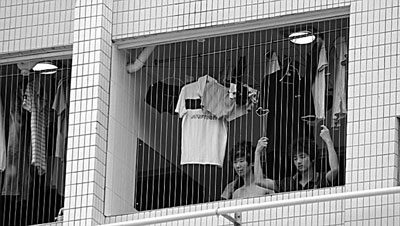
 The spectrum for Beijing, is the birth of an independent trade union
The spectrum for Beijing, is the birth of an independent trade union
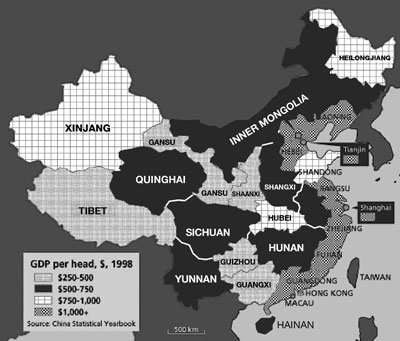 According to data of the Government, reported by Masucci, Manlio in a newspaper article on the Achievements of Labor (13), "[...] in 2009 the increase of the salary of Chinese workers was 5.1% lower than at 'previous year, marking a record low not seen since 2001, while wages for employees of small and medium-sized enterprises specialized in the export increate from 20 and 30% [...]. Government agencies also point out that the number of collective disputes is literally exploding in recent years, increasing from 314,000, recorded in 2005 to 690,000 in 2008 while in the early months of 2009, the total number had reached 519,000. The number of civil cases relating to disputes work is increasing dramatically. In parallel with lawsuits and protests, accidents have increased leading analysts to conclude that the government's labor disputes are currently a leading cause of conflict in China. Strikes, protest marches, appeals to the rights of workers are, in fact, followed each other relentlessly in recent years, leading, in some cases with dramatic results. This applies to the factory where Tonghua, in July 2009, a manager has died after being attacked by the workers of the Lingang factory exacerbated where the deputy was held hostage for ninety days. According to the police of the city of Shenzhen, one of the major production areas of China, labor disputes are among the leading causes of social tensions within the perimeter of the city. In 2008, the number of accidents related to workers' protests amounted to 637, an increase of 119.7% over 2007, while only in January of 2009, accidents had already in 1997 an increase of 61.7% compared previous year. [...] The situation untenable, then, is causing widespread resentment among the public also [...]".
According to data of the Government, reported by Masucci, Manlio in a newspaper article on the Achievements of Labor (13), "[...] in 2009 the increase of the salary of Chinese workers was 5.1% lower than at 'previous year, marking a record low not seen since 2001, while wages for employees of small and medium-sized enterprises specialized in the export increate from 20 and 30% [...]. Government agencies also point out that the number of collective disputes is literally exploding in recent years, increasing from 314,000, recorded in 2005 to 690,000 in 2008 while in the early months of 2009, the total number had reached 519,000. The number of civil cases relating to disputes work is increasing dramatically. In parallel with lawsuits and protests, accidents have increased leading analysts to conclude that the government's labor disputes are currently a leading cause of conflict in China. Strikes, protest marches, appeals to the rights of workers are, in fact, followed each other relentlessly in recent years, leading, in some cases with dramatic results. This applies to the factory where Tonghua, in July 2009, a manager has died after being attacked by the workers of the Lingang factory exacerbated where the deputy was held hostage for ninety days. According to the police of the city of Shenzhen, one of the major production areas of China, labor disputes are among the leading causes of social tensions within the perimeter of the city. In 2008, the number of accidents related to workers' protests amounted to 637, an increase of 119.7% over 2007, while only in January of 2009, accidents had already in 1997 an increase of 61.7% compared previous year. [...] The situation untenable, then, is causing widespread resentment among the public also [...]".
Ivan Franceschini, representative of Iscos in Beijing and an Italian expert on labor law in China, in his article "The freedom of association in China" (14), explains how in this country there is a clear definition the right to strike. In the new constitution of 1982 was not included. In 2001, China ratified the UN Covenant on Economic, Social and Cultural Rights that includes expressing a reservation to paragraph 1 of the Pact, which enshrines the "right of individuals to form and join trade unions themselves." No reservations of the Chinese legislature, however, the paragraph concerning the right to strike, however, is still relegated to a kind of legal limbo. In fact, despite these openings, the Criminal Code still provides for very severe penalties for those who strike: up to three years in prison for those actively involved, from three to seven years in prison for those who promote it. Organize or participate in a strike in China, considered a crime against state security, remains a very risky business. The same applies, but with less tolerance for attempts to create independent trade unions in China, which continue to be severely repressed.
The fact that China has not yet ratified the international conventions on freedom of association and the right to collective bargaining, is not only an ethical issue, but in recent years has been the main threat to the indirect system of guarantees, rights and historical achievements that the workers' unions in Europe (and elsewhere) have achieved through hard struggles. The majority of people in China, as a result of restrictions on trade union rights, works without a contract. And the ACFTU itself admits that collective agreements are limited in most cases to apply the minimum wage.
Honda's example shows, however, the growing ability of workers to join their claims. The increased number of spontaneous strikes initiated by workers seems somehow "making fun" of the absence of freedom and independence, imposed by the communist state. The warm days are announced in China and not only as a result of climate change, but also for workers' struggles.
The case of Honda marked a turning point in the history of strikes in China. Not only that wage demands have punctuated the debate on economic policy, but is under fire over the Chinese Federation of Trade Unions ACFTU. Founded in 1925, it has always been the driving belt of the Chinese Communist Party. Structured according to the principles of "democratic centralism" the ACFTU is divided into 12 national industrial unions and more than one million trade unions organized on a territorial basis. Formally, with over 150 million workers enrolled, is the largest central trade union in the world. Despite these numbers, the role of trade union representation and protection of workers is almost non-existent, "switched off" as some young workers of the Honda have called it. The trade union law of 1992, "in the name of socialist state power, the dictatorship of the people, the leadership of the CCP, Marxism-Leninism-Mao and Deng Xiaoping Theory," contains three outliers. The first denies the freedom of trade unions, while the second imposes a strict hierarchical structure and control of the union, while the third defines the function of the union (guarantor of production) as a defender of the interests - not just for workers - as employers .
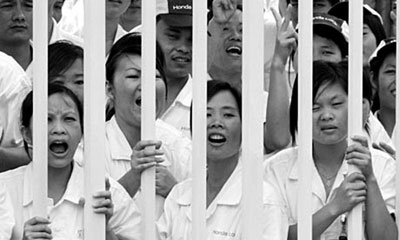
In 2001, with entry into the WTO, the trade union legislation has been amended at least on this point. The trade unions must "represent the rights and legitimate interests of workers under the law" and "the duties and functions of trade unions are essential to safeguard the rights and legitimate interests of workers." The key issues, such as the right to proclaim union strikes and autonomy to the state and enterprises still remain taboo, but at least this change has brought the legislative function of the union in its natural environment. In reality, however, the transformation of the official union is not successful, because the ACFTU continues to be economically dependent on funds paid by the enterprise and by government subsidies.
The need to access these resources drives the ACFTU to adopt a policy of compromise with the management of private enterprises, usually ensuring that no action will be taken and by allowing collective, even, it's the same company to appoint union representatives. This explains why China, unlike in other countries, transnational corporations - such as Carrefour, McDonald's, Motorola, Nestle, Samsung and so on. and even a sample of anti-unionism as Wall-Mart - all agree, after the initial mild opposition, the presence dell'Acftu in their production and sales units.
The lack of autonomy of the union officers from management has been a constant in the strikes that have spread in 2010. It was apparent that the "official" representative mechanism of the employees has failed. (15) Employees may not elect their own delegates. Foshan To the workers of Honda have struggled with clarity and method for their rights were being respected. In an open letter published on June 3, harshly criticizing the union official, wrote that they hope to "get the democratic election of union representatives and the establishment of a mechanism for collective bargaining." At the same time they have requested the establishment of an independent trade union of workers to help them in their struggles.
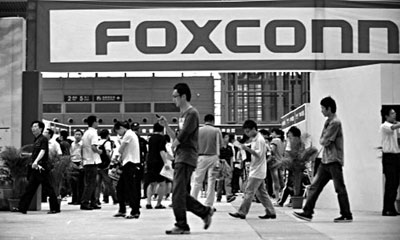
Even in the strikes after the Honda Lock Zhongshan workers have developed a sophisticated democratic organization, electing 20 delegates in the department union to represent them in collective bargaining with management. They also are demanding the right to form a union independent of the ACFTU, which focuses solely for the maintenance of social peace for foreign investors. "The union official is not representing our views, we want our own union that represents us now," said a worker striker, who insisted on anonymity for fear of retaliation by government authorities or of the company.
Some people look at these embryos of growth autonomy union with sympathy, as symbols of a new acquisition of knowledge by workers. But for Professor Qiufeng of Jinan University in Guangzhou says that the strike is "good news" because the demands of workers can help China become a more open society. "China must understand that to improve itself and its people should allow unions to operate freely within the territory. But this is unthinkable today: just think of how it is dealt with freedom of expression to understand that Beijing will not allow it soon. But the strikes in the large factories, such as happened at Honda, bode well for the future, sooner or later the Chinese policy-makers will understand that without labor protection, they risk unprecedented social explosion. "
According to Professor Chang Kai industrial relations in China are changing. The workers have realized that individually are unable to enforce their rights, have begun to make collective struggle. For Chang Kai strikes are normal phenomena in a market economy. They are the only means available to workers to make their voices heard and defend their interests. Even in China since the union, which should be the crucial support of workers does nothing. The ACFTU is not an effective workers and prefer to stand next to the business and take care of its interests. This is because the union structures in China are not born at the initiative of workers and union leaders are not elected by the members. Indeed, in many companies, the employer shall exercise full control over the union.
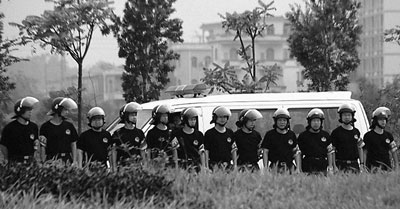
At Honda, the union official has sided openly with the direction to suppress strikes. In this way they lost credibility and, as explained by Chang Kai, he has denied the same role assigned to it by the new Chinese law on trade unions in 2001. Not surprisingly, then, that the workers violating the regulations imposed by a trade union linked to the party and business, choosing the spontaneous strike to assert their own needs. The virus of trade union rights, we hope, that ends up infecting other Chinese companies, in Guangdong, starting from where they concentrate most of the foreign direct investment of transnational companies, including those with the Italian parent. (16) The unusual patience, however, demonstrated so far by the Chinese government towards the strike, there seems to be working towards forms of organization, embryos of unions with legal autonomy and alternatives to union officials, tightly integrated in the party. The prospect of the development of trade unions, who democratically elect their representatives, handle contract negotiations and strikes, raises difficult issues for the Chinese Communist Party's obsession with social stability and political control. On these obsessions friend Han Dongfang is usually ironic: "In the U.S. in the twenties it was said that the free trade unions would lead to communism, but it did not happen. For an irony of history, almost a century later in China, the Communist Party to say that free trade unions would turn the country into a democracy. " (17)
After the Honda strike, in academia there are more and more Chinese voices raised in support of construction of real trade unions to defend the interests of the workers. Elsewhere would be considered a trivial statement. In mainland China, in contrast, a value almost revolutionary, and, above all, encouraging a rash in power!
1 A trade unionist in Hong Kong: "The Suicide Factory, the result of indifference," Asia News 28 May 2010.
2 Suicides at Foxconn: capitalism and Marxism treat people like animals, Asia News 31 May 2010
3 New third generation shakes China labor landscape, Reuters, June 1, 2010
4 GianPaulo Visetti, worker strike China, la Republica, June 1, 2010
5 China Labour Bulletin,
6 David Barboza and Keith Bradsher, In China, a Labor Movement Aided by Modern Technology, The New York Times, June 16, 2010
7 Other strikes have been concluded with wage increases of the order of 20-40% in the following factories: Ingersoll-Rand in Zhongshan, which produces air-conditioning systems; NHK-Uni Spring in Guangzhou that produces suspensions for cars (Toyota, Honda , Nissan) in Tianjin Mitsumi Electric, which produces electronic components (3000 workers); Wantai Group in Zaozhuang, Sinopec Yizheng Chemical Fibreo; Weixun Electronics in Suzhou, Datong in Shanxi Xinghua, pharmaceutical industry (10,000 workers); Vinylon in Lanzhou (2000 employees); Halong Electronics in Xiamen, Shenzhen Meilv Electronics (2000 workers); Xieshu Group in Suizhou (400 employees); Yacheng Electronics Huizhou (over 2,000 employees); Simaibo Sports Equipment in Juijiang (7000 workers ) Mechanical Engineer Lab in Zhuhai, in Yangtze River Delta, which produces computer (2,000 workers); Tongbao Optical in Shanghai, Tianjin Toyoda Gosei a supplier of automotive components.
8 Roberts Bloomberg, Honda Rises After Most Workers End Strike in China, Business Week, June 6, 2010
9 Luca Vinciguerra, Strikes in China: "Many foreign companies are worried about Beijing and ends the era of low cost labor", Sole 24 Ore, June 6, 2010
10 strikes in New Hondas of Foshan. The company threatened dismissal, Asia News, July 12, 2010
11 Kevin Krolicki, Toyota chief: China labor trends Both good and bad, Reuters, July 9, 2010
12 China's labor market, The Next China: As the supply of migrant labor dwindles, the workshop of the world is embarking on a migration of ITS own, The Economist, July 7, 2010
13 Manlio Masucci, China, most collective bargaining to resolve conflicts, conquests of Labor, January 19, 2010
14 Ivan Franceschini, the Freedom of Association in China, labor rights Markets, quarterly journal No. 2, 2009
15 Chinese law recognizes the right to form a union representation for workers in firms that have at least 25 employees.
16 In addition to Piaggio are in Guangdong with their production sites other Italian companies as Bottero, Cogne, Compel, De Longhi, Magneti Marelli (Fiat Group), Megadyne, Sacmi Ceramic Machinery, Somacis, St Microelectronics, Auto Parts etc. Util.
17 Han Donfang has promoted China's first independent trade union in 1989 (during the riots in Tiananmen Square). Arrested and jailed for three years, was then expelled from China. For years he worked in Hong Kong, where he founded the China Labour Bulletin.